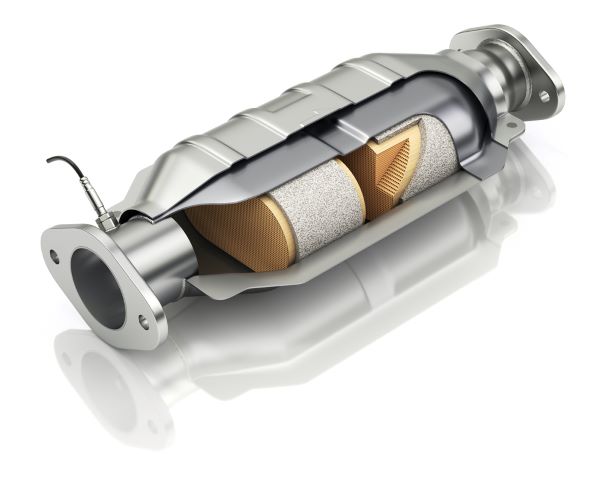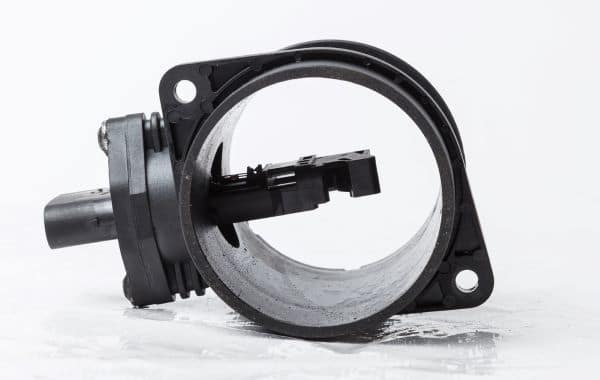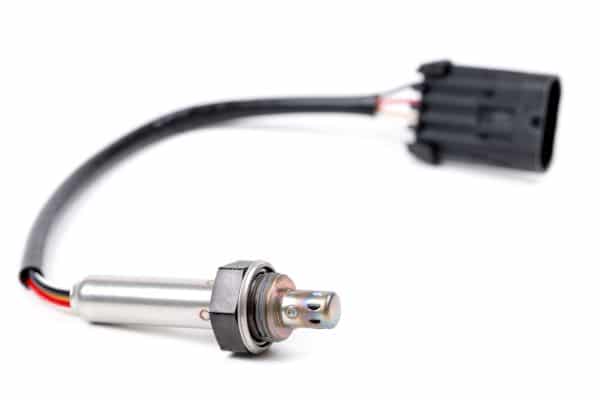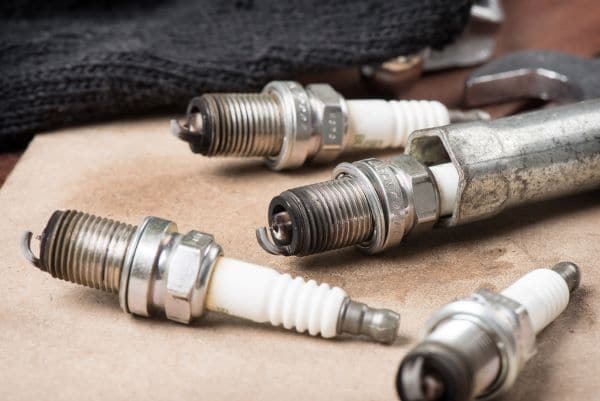We understand how important your Chevy truck is to you, which is why it is so troublesome when there is a problem. If your Chevy truck is losing power when accelerating, you might have a minor issue or a major problem. Either way, it should never be ignored.

Some of the most common reasons that your car is losing power could be related to a mechanical issue, such as a clogged fuel filter, low compression or a dirty air filter. However, there’s also the chance that some of the sensors are malfunctioning, such as the MAF sensor, camshaft position sensor, crankshaft sensor or oxygen sensor. Finally, you can’t overlook the possibility that one of the other components is bad, such as a fuel pump, spark plug or an injector.
In this article, we discuss the reasons that your truck has no power when accelerating. Some of these power issues are relevant for gas and diesel trucks, while others might only be on one or the other. Additionally, we will discuss the cost of replacement for each problem.
Table of Contents
1. Low Compression
This problem is relevant to both gas and diesel trucks. For the engine to run correctly, there must be adequate cylinder compression during the combustion process. When compression is low, you can expect the same from the motor’s power.
Symptoms of Low Engine Compression
Some of the top signs of low engine compression include:
- Misfires
- Car losing power when accelerating
- Poor fuel economy
- Engine fails to start
Low Engine Compression Causes
Low engine compression can be caused by a multitude of problems, such as:
- Holes in the piston
- Leaky valves
- Head gasket failure
- Defective piston rings
- Worn timing chain
- Broken camshaft
Repairing Low Engine Compression
Can you drive with low engine compression? In some cases, you could. If there is only one cylinder with low compression, your truck should still run, but performance will be decreased. However, you are going to struggle to get up hills and the problem will continue to get worse until it is repaired.
To repair the low compression issue, you will need to replace or fix the part causing trouble. The first step is to have a professional compression test performed, which can cost between $100 and $200.
Some repairs can be low-cost, such as replacing the timing chain, which might only be around $500 to $700. However, if the engine needs to be torn apart for a fix, such as if there are bad piston rings or you need a head gasket repair, your bill could easily become $1,000 to $3,500.
2. Clogged Fuel Filter
Both gas and diesel engines come with a fuel filter placed between the pump and injectors. Its job is to filter the fuel and remove any impurities that could harm the engine. If the fuel filter is dirty or contaminated, it can’t do its job, thereby creating acceleration issues. Plus, the debris could get into the engine, causing irreparable damage.
Symptoms of a Clogged Fuel Filter
When the fuel filter clogs, you might notice these symptoms.
- Trouble starting the engine
- Sputtering
- Inconsistent acceleration
- High engine temperatures
- Poor fuel economy
- Check Engine Light
Clogged Fuel Filter Causes
Sometimes, it’s just time for the fuel filter to be changed, while other times, you might have these problems.
- Rust from the fuel tank
- Sediment from poor quality fuel
- Moisture in the fuel tank
- Silt deposits from the gas station tanks
Repairing a Clogged Fuel Filter
The fuel filter itself is inexpensive. You can purchase a new Chevy fuel filter for $10 to $40. However, if you can’t install the fuel filter yourself, you will need to pay for some labor, which could add another $60 to $120 to your bill.
3. Clogged Air Filter
While we are discussing clogged filters, the air filter is another component on both gas and diesel engines that could be clogged, thereby causing performance issues. Air must make its way into the combustion chamber for the engine to work correctly. Before the air mixes with the fuel, it goes through a filter that removes debris, bugs or contaminants.

If those impurities make their way into the engine, there will be severe damage. That’s why you want to change your air filters regularly. A clogged air filter can sometimes be cleaned, but it’s usually better to replace it.
Symptoms of Clogged Air Filter
The clogged air filter will often exhibit these symptoms.
- Slow acceleration
- Poor fuel economy
- Misfiring engine
- Engine noises
- Check Engine Light
Clogged Air Filter Causes
Your engine air filter should be changed regularly. If it is being replaced, but you still notice it getting clogged, it could be because of these reasons.
- Poor air quality in the environment
- Driving down dusty roads
- Driving off-road
Repairing a Clogged Air Filter
The air filter is a cheap part that should only cost around $5 to $25. In many cases, it is also easy to replace. However, you will spend the minimum labor rate at your local shop if you can’t do it yourself.
4. Clogged Exhaust Pipe
Your exhaust system also contains filters, known as the catalytic converter and the muffler. The catalytic converter removes pollution from the exhaust gases, while the muffler reduces the noise level. If any of the pipes or exhaust components are clogged, you could notice performance problems with your Chevy truck.

This problem can happen with gas and diesel engines. You will notice acceleration issues with any exhaust clog, but it’s often worse if your vehicle is turbocharged.
Symptoms of a Clogged Exhaust Pipe
If your truck has a clogged exhaust pipe, you might notice these symptoms.
- Decreased power and acceleration
- More exhaust noise
- Decreased fuel economy
- Check Engine Light
- Burning smell
- Fuel smell
Clogged Exhaust Pipe Causes
Here are some of the most common reasons that a clog occurs in the exhaust system.
- Preventative tune-ups haven’t been performed
- Defective spark plugs
- Oil or coolant enters the system
- Unburned fuel enters the system
- Failing oxygen sensor
- Road damage
- Emissions test failure
Repairing a Clogged Exhaust Pipe
The cost to repair your exhaust system can be quite pricey, especially if you need to replace the catalytic converter. Some people choose to use an exhaust treatment additive to see if that does the trick. If it doesn’t, expect to pay $1,000 or more for catalytic converter replacement.
5. Defective MAF Sensor
If you have a gas-powered truck, you could be looking at a malfunctioning MAF sensor. The main job of the Mass Airflow Sensor is to measure how much air gets into the engine. This data is sent to the Powertrain Control Module for optimization.

The module uses the data to determine how much load is on the engine. If the sensor were to malfunction, it would create performance issues, such as trouble accelerating.
Symptoms of Defective MAF Sensor
When the MAF sensor goes bad, you might see these symptoms.
- Acceleration/performance trouble
- Misfires
- Difficulty starting engine
- Stalling engine
- Hesitation or jerking while driving
- Check Engine Light
Defective MAF Sensor Causes
The MAF sensor can fail at any time because of these conditions.
- Contamination
- Electrical connection fault
- Damaged sensor components
- Vibration
Repairing a Defective MAF Sensor
The cost to replace your MAF sensor could be $70 to $400. If you choose an aftermarket sensor, you will often pay less than with an OEM replacement. You should also be able to replace the mass airflow sensor yourself. Some people try to clean the sensor before replacing it to see if that fixes the problem. If this works, you have saved yourself a good chunk of change.
6. Malfunctioning Camshaft Position Sensor
In your gas or diesel Chevy truck engine, there is a camshaft position sensor. Its job is to gather data on the camshaft timing and send this information to the electronic control module (ECM).
Once the ECM receives the timing, the computer determines how to manage the ignition and fuel injection to match the camshaft. When there is an issue with the sensor, it won’t send the right information, thereby affecting your truck’s performance.
Symptoms of Malfunctioning Camshaft Position Sensor
If the camshaft position sensor is failing in your Chevy truck, here are some symptoms you might notice.
- Check Engine Light
- Difficulty starting
- Trouble accelerating
- Vibration
- Stalling
- Backfiring
Malfunctioning Camshaft Position Sensor Causes
There are multiple things that can cause the camshaft position sensor to fail.
- Old age
- Constant use
- Moisture or water damage
- Oil build-up
Repairing a Malfunctioning Camshaft Position Sensor
To replace the camshaft position sensor, you can expect to pay around $100 to $200. The parts should be under $100, with the rest of the cost as labor. As with many of the other sensors, it isn’t usually difficult to replace this part on your own if you want to save some money.
7. Malfunctioning Oxygen Sensor
As exhaust leaves the gas-powered vehicle, the amount that makes its way into the environment is measured by the oxygen sensor. The ECM uses this data to determine how much more oxygen is needed in the engine for proper performance.

Most vehicles have more than one oxygen sensor measuring these gases. If one fails, the wrong data gets sent to the engine computer, causing performance issues. Not only does this make it harder to drive your Chevy truck, but it could also mean that you are inadvertently harming the environment.
Symptoms of Malfunctioning Oxygen Sensor
If one of the oxygen sensors fails, you might notice these symptoms.
- Poor acceleration
- Hesitating engine
- Check Engine Light
- Poor fuel economy
- Emissions test failure
- Rough idle
Malfunctioning Oxygen Sensor Causes
The oxygen sensors are made to last 100,000 miles or more. However, some issues can cause them to fail prematurely.
- Byproducts from combustion get caked on the sensor
- Using low-quality fuel
- Failing to do preventative maintenance
Repairing a Malfunctioning Oxygen Sensor
The oxygen sensor itself isn’t normally more than $100. However, some of them can be difficult to replace, depending on its location. Expect to pay between $100 and $400 for the labor.
8. Bad Fuel Injector
Both gas and diesel engines have fuel injectors. The role of this vital part is to spray fuel into the engine, where it will be combusted.
The engine’s computer controls the fuel injector at regular intervals with a repetitive pattern. Your truck’s computer will make adjustments to the fuel injector to optimize performance.
However, when a fuel injector becomes damaged or starts to fail, the engine might not get the fuel it needs to perform. This crucial component can leave you stranded when it fails.
Symptoms of Bad Fuel Injector
If an injector fails, expect to see some of these symptoms.
- Poor performance, including trouble with acceleration
- Decreased fuel economy
- Car doesn’t start
- Check Engine Light
- Rough idle
Bad Fuel Injector Causes
There are a lot of problems that can lead you to believe that the fuel injector is bad, but there are only a few causes that will actually cause it to be defective.
- Dirty or clogged
- O-ring failure
- Broken mechanically
Repairing a Bad Fuel Injector
If the fuel injector is dirty or clogged, it might be possible to fix the problem with a fuel injection cleaner. If this doesn’t work, you might need to replace it. In many cases, you can purchase a new fuel injector for between $100 and $300. In some cases, it might be easy to replace. Otherwise, you could look at about $200 to $400 to have a mechanic replace it.
9. Bad Fuel Pump
The gas and diesel engine has a fuel pump that moves the gasoline from the tank and transfers it to the engine. The fuel pump must send not only the right amount of fuel but also the correct amount of pressure.

If the fuel pump fails or malfunctions, it could lead to a lot of performance issues. It could also leave you stranded.
Symptoms of Bad Fuel Pump
When the fuel pump is failing, you get some warning signs.
- Engine sputtering, especially at higher speeds
- Trouble accelerating
- Check Engine Light
- Decreased gas mileage
- Trouble starting the engine
- Stalling engine
Bad Fuel Pump Causes
There are a number of reasons that the fuel pump can go bad. Here are the top three.
- Old age causing the mechanical parts to wear out
- Contamination from bad gas or clogged filter
- Overheating from running the tank too low
Repairing a Bad Fuel Pump
It isn’t usually cheap to replace the fuel pump, which is why you want to replace the filter regularly. If you need a new fuel pump, expect to pay about $90 and $800 for the part alone, with higher costs on the OEM replacements. Additionally, you might need to pay about $100 to $300 for the labor costs if you aren’t familiar with replacing the fuel pump yourself.
10. Failing Ignition Coil
The ignition coils on a gas engine are part of the ignition system. They are responsible for engine management, converting 12 volts of power into 20,000 volts. This is the amount of voltage needed to create a spark.
This spark is what ignites the fuel and air mixture in the engine. When the ignition coils fail, the truck will stop accelerating and all power would be lost.
Symptoms of Failing Ignition Coil
As the ignition coil starts to fail, you might notice some of these symptoms.
- Misfiring engine
- Trouble starting the engine
- Difficulty accelerating, especially up hills
- Rough idle
- Poor fuel economy
- Check Engine Light
Failing Ignition Coil Causes
The ignition coils can fail for several reasons, including:
- Bad spark plugs
- Excessive engine heat
- Increased engine vibration
- Old age
Repairing a Failing Ignition Coil
You can avoid needing a new ignition coil by performing regular maintenance. However, if you need a new ignition coil, you might have to pay around $150 to $200 for the part and another $50 to $100 for the labor if you can’t do the job yourself.
11. Bad Spark Plugs
Gas engines contain spark plugs as part of the ignition system. These vital components ignite the fuel and air mixture for combustion. The ignition coil is responsible for sending the electrical signal to the plugs, which activates them.

Spark plugs should be changed as part of regular maintenance. If they go bad, you are going to face engine performance issues. If you continue to run bad spark plugs, you can face even more trouble, such as a defective catalytic converter.
Symptoms of Bad Spark Plugs
When the spark plugs get fouled or go bad, you will often notice these symptoms.
- Rough idle
- Poor acceleration
- Misfiring
- Trouble starting the engine
- Decreased fuel economy
- Check Engine Light
Bad Spark Plugs Causes
Spark plugs are part of regular maintenance and should be changed as per the service recommendations. However, there are reasons other than age that can cause them to fail.
- Contamination
- Incorrect heat range
- Improper gapping
- High engine temperatures
- Incorrect torque
Repairing a Bad Spark Plug
It doesn’t cost a lot to replace your Chevy truck’s spark plugs, which is why you should never neglect to perform a tune-up. In total, you should spend less than $75 for a complete set of spark plugs. If you can change them yourself, there should be no labor cost. Otherwise, a professional mechanic might charge you $50 to $200 for a tune-up.
Troubleshooting Chevy Truck Acceleration Issues
As you can see from the lists above, many of these problems exhibit the same symptoms. So, how do you know what’s causing your Chevy truck to lose power while accelerating? The key to troubleshooting engine performance is to use an OBDII scanner. With these diagnostic tools, you can pinpoint where the trouble is originating from, making it easier to repair the problem.
Conclusion
You should never prolong fixing your Chevy truck acceleration problems. If it is something simple causing the performance to decrease, you could fix it quickly and avoid more costly repair bills down the road. Take care of your Chevy engine to ensure many more miles of adventure.
